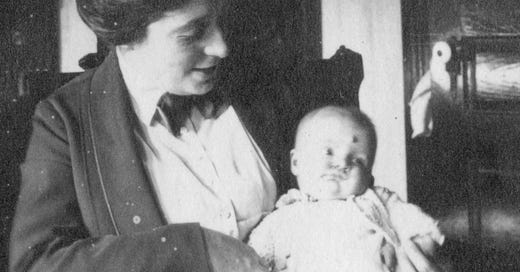My First Old Person
Marcia Aldrich recalls her late grandmother, Erma King Aldrich.
The first person who portrayed old age for me was my grandmother, my father’s mother, Erma King Aldrich, the woman who bore my last name, the woman I called Nana, the only woman in my family who made me feel loved.
I don’t know much about her history because she said nothing to me about it. There was nothing to offer—to me—and I was too timid, or too much of a trusting child, to ask. I do know she had been married to Roscoe Hilton Aldrich, who started the Aldrich Pump Company of Allentown, Pennsylvania, a successful enterprise until it wasn’t. They had two children, my aunt Jane and my father David. The company went bankrupt and Roscoe died of stomach cancer soon after, leaving no provisions for his family. My father, then a student at Lafayette College, dropped out to work and support them all.
A few years later, when my father married my mother, Nana moved with him into what had been my mother’s house in Catasauqua because he couldn’t afford to pay for a separate residence. I was not yet born, but my older sister remembers our grandmother as a frightening, arthritic figure who walked with a cane. My father later prevailed upon her brother Claude, a bachelor of means, to pitch in, and Nana was moved into her own apartment in Allentown on the corner of Hamilton and Fifteenth Street. My father handled all of her affairs and stopped in to see her after work several nights a week, visiting for a little bit, taking out the trash. By this time, arthritis had made her a shut-in in a wheelchair. Except for holidays like Christmas and Thanksgiving, she stayed in her apartment. The local grocery store delivered her food, and the Episcopal minister visited, as did a hairdresser.
On July 4, Independence Day, when I was 7 years old, Claude died, leaving his money in trust to support his sister. And so her external life became fixed.
By the time I came along, my grandmother had lost her uprightness and definition. Walking with a cane was no more, for the arthritis had advanced…A young girl, I concluded that being old meant you were dependent on others, immobile, and often in pain. She was still in her late 60s, a fact that now stuns me.
I don’t know much of her history, as I’ve said, but I do know something else of her, a knowing that comes from spending time with her. By the time I came along, my grandmother had lost her uprightness and definition. Walking with a cane was no more, for the arthritis had advanced. It twisted and swelled her hands and fingers, her legs and feet. Her skin was paper white, unearthly, and whenever she knocked into something, which happened often, her skin bruised, bright pink blotches that turned purple. A young girl, I concluded that being old meant you were dependent on others, immobile, and often in pain. She was still in her late 60s, a fact that now stuns me. She seemed ancient from the beginning.
My parents had a standing date every Saturday night, and my father dropped me off at my grandmother’s apartment, where I spent the night. I slept on a pull-out couch in the small living room at the front of the apartment, whose bay windows looked out onto the main thoroughfare of Hamilton Boulevard. In December the empty lot across the street filled with Christmas trees for sale, and together Nana and I would watch families select their trees and tie them to the roof of their car. There was no room in her apartment for a tree. The apartment was dark and hadn’t been refurbished—everything had turned a stale shade of brown, almost sepia colored, drenched in neglect. The paint on the radiators was chipped and they thundered awake in the morning, alive like prehistoric creatures. Sunday morning my father would pick me up and the two of us would go on to church, just three blocks from my grandmother’s apartment building.
I have heartbreaking memories of the meals she made for me. Off the small living room that housed the couch, a boxy television, and a big green easy chair was the tiny, unventilated kitchen. A square table pushed up against the wall, and the remaining space was so cramped it was nearly impossible for her to maneuver. Living alone, my grandmother did not do much cooking. You can imagine the difficulties she faced. She was sunk low into her wheelchair, with faint strength to hoist herself up to work at the counter or see into a pan on the stove. Her weak eyesight and twisted hands made a hot pan treacherous. Despite these difficulties, which would make another person—which would make me—fall back on a ready-made frozen dish, my grandmother exerted herself to cook on my behalf.
My grandmother prized her independence, though it was paltry by most standards. Relegated to a wheelchair, in chronic pain, forced to heave herself with great difficulty into her brocaded chair, or bed, or toilet, maybe she swore aloud at her struggles when I wasn’t around—who wouldn’t?
She made two meals during my weekly Saturday-to-Sunday stay: for dinner, always meatloaf, baked potatoes, and peas, and pancakes for Sunday breakfast. These were our only meals, never to be varied. I don’t know why she stuck to these two and never moved from their mark. I was a picky eater, and perhaps she was confident I would like these dishes. Or perhaps these were the only meals she felt capable of cooking. As time went on and her condition worsened, the food was less and less cooked through. Near the end, the meatloaf was raw in its interior, a red stack of meat to poke on my plate. and the pancakes on Sunday morning were runny in the middle, something to spoon into my mouth. Objectively speaking, they weren’t very good, but I ate them with relish. I claimed to myself that this was how I liked my pancakes and my meatloaf, and in some ways that was true. I couldn’t hurt my grandmother’s feelings. Not hers. She was the only person in my intimate world who cooked for me, who cared for me. My sisters found her contorted fingers off-putting, even frightening, but I did not. She was mine, and I was hers.
Eating a raw meal became part of our Saturday night routine. After dinner we’d play Go Fish on the little table I’d pull up in front of her brocaded green chair, and I’d sit on the matching stool. We’d play Crazy Eights—easy games that she would let me win, and she’d ask me about my week and how I was getting along with my mother. She didn’t get along with my mother any better than I did. Then it would be time for Have Gun—Will Travel and after that Gunsmoke. This is how I spent the Saturday nights of my youth, first watching a man who carried a concealed derringer and then a show about Dodge City with Chester, Doc Adams, Miss Kitty, and, of course, Marshal Matt Dillon. I still love how Have Gun—Will Travel opened, with a shot of a revolver being cocked and then rotated to point the barrel straight at the viewer. And I always eat my pancakes runny in the middle, to taste the slightly bitter tang upon my tongue.


During my senior year in high school, my father and Aunt Jane determined that my grandmother, then 80 could no longer live alone. She was growing senile and had reached that point when she had to move into a care facility. I was on spring break when Aunt Jane flew in from Georgia to help my father with the move, staying in Nana's apartment. They didn’t want to impose this on their mother and were very glum.
My grandmother prized her independence, though it was paltry by most standards. Relegated to a wheelchair, in chronic pain, forced to heave herself with great difficulty into her brocaded chair, or bed, or toilet, maybe she swore aloud at her struggles when I wasn’t around—who wouldn’t? Maybe she wished for mobility, respite from loneliness, greater ability to manage the basics of her life. Still she lived on her own terms, her small apartment her estate. That’s how I came to think of it. I feel certain that, despite senility, she knew a move she did not want was afoot.
Having reached my late 60s, I’m going to find out exactly what kind of old person I will be. I might be some child’s first old person: what will she see?
At the end of my grandmother’s last day in her apartment, around midnight, Aunt Jane heard the wheels of her chair squeak on the floor in the bathroom. There she had a massive heart attack and died.
Having reached my late 60s, I’m going to find out exactly what kind of old person I will be. I might be some child’s first old person: what will she see? As he was driving me to my grandmother’s on Saturday night, my father often pointed out a man he knew, a man thin and upright who wore a blue wool beret and matching blue coat with a plaid scarf tied jauntily around his neck. He walked with great speed and determination up and down the streets of Allentown, his regular constitutional. Brisk, mobile, out and about, this man was another old person. He was a widower like my grandmother, both of them making their way alone. That aloneness lodged in my thinking as defining old age.
Which old person will I be if I make it that far? Will I be like my grandmother, a shut-in, dependent, my life circumscribed by illness and pain, relying on deep emotional resources to get through a day, resources I doubt I possess? Or will I be like the man in the blue beret, walking briskly wherever I want to go? They were both alone and probably lonely, but the man was able to move, and that seems terribly important. Or will I be like neither of them, a vision of age I have yet to realize? What I know from my grandmother’s Saturday nights is that age turns like a derringer and aims its barrel unerringly.








What a beautifully written tribute to your grandmother and a thoughtful post about how aging will affect you. We can change some odds by making good choices but some things we have little control over. My grandmother was blind and cranky. Very cranky. My dad was blind and cranky. Very very cranky. I am determined, if that's my fate, to have a seeing eye dog and use technology as much as possible. But who knows...
This love letter to your grandmother is so tender and beautifully written. Reading it conjured images of my own. I am named after my grandmother who was impoverished frail and asthmatic. She had a large family and little time for sentiments but made me feel safe and loved. Having recently married and been given the gift of two grandsons, I do my best to remember what I am modeling for them.